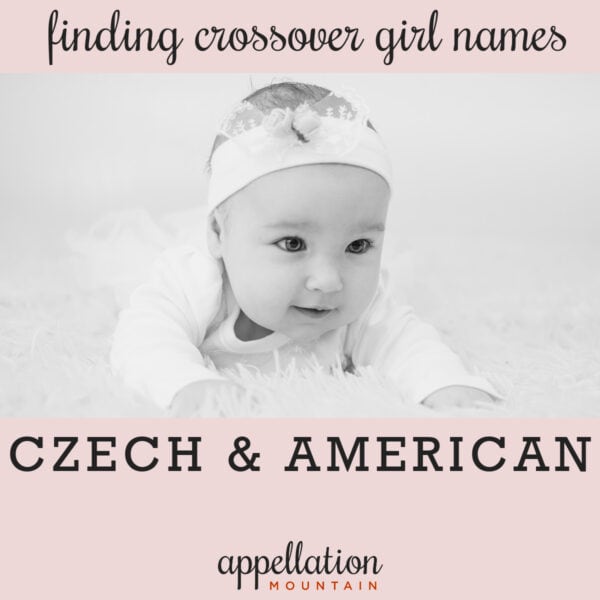
She’s a short, sweet complete name with a surprisingly international pedigree.
Thanks to Nicole for suggesting this name, and to Anna for suggesting it was time to update our Baby Name of the Day: Nina.
Nina, Lena, Gena, Tina – it is easy to dismiss them all as diminutives, short forms of longer names.
In Nina’s case, she can come from Italian and Spanish names, like Antonina and Giannina, a form of Giovanna. She’s also found in Russian, from Annina, an elaboration of Anne, or Antonia. Other -ina names, like the German Katharina, could also lead to Nina.
Except that Nina stands on her own very nicely, with plenty of possible origins:
- The Spanish word for girl is niña.
- Among the Quechua of South America, Nina means “fire.” Once the official language of the Incan Empire, it’s still spoken by more than 10 million people, mostly in Peru and Bolivia.
- In the early 300s, a woman called Nino cured a queen and converted ancient Iberia – the modern-day Republic of Georgia – to Christianity. Catholics call her Saint Nina, but Nino remains a female given name in Georgia.
Here’s one more reason to think she works an an independent name: Nina was an ancient fertility goddess. She lent her name to the city of Nineveh, the capital of the Assyrian Empire, back around 1800 BC.
Nina is related to Ishtar, as well as to the Sumerian Inanna and the Semitic Astarte. Whether she was used as a given name is hard to say, but such ancient use lends Nina some strength. And some suggest that Ninos – the masculine form of Nino – comes from the goddess. Today, Nineveh is little more than ruins, part of modern Iraq.
In the US, Nina has ranked in the Top 1000 every year since 1880. Since the 1990s, she’s hovered in the 200s – neither common nor obscure. She fares better internationally, ranking in the Top 100s of Poland, Slovenia, Croatia, Austria, Belgium, France, and the Netherlands.
Fictional Ninas abound, with plenty on television series. There’s also:
- The stylish Nina Garcia of Project Runway fame, also fashion director at Marie Claire magazine.
- Eclectic, influential jazz singer, classically trained pianist, and civil rights activist Nina Simone lends the name some serious strength. She was born Eunice, but a boyfriend nicknamed her Nina, from the Spanish word for little girl – her debut album was called Little Girl Blue.
- There’s a little-known 18th century opera by Giovanni Paisiello called Nina, or the Girl Driven Mad by Love.
- One of Christopher Columbus’ ships born the name – but in the case of the caravel, it was probably a twist on the name of the ship’s owner, Juan Nino.
Some sites also suggest Swahili, Arabic, and Native American use, but those are a bit more elusive.
Variant spelling Nena has seen some use, and earlier in the twentieth century, Nina was regularly pronounced like the number nine, even though today the first syllable nearly always rhymes with keen.
All of this makes for a name that would be recognized nearly anywhere in the world. If you’re after a familiar name that isn’t common, and a portable, culture-spanning choices, there’s lots to love about Nina.





A famous Nina was the Danish ’50s/’60s singer Nina, Baroness van Pallandt, who with her Dutch husband was a big star in Europe, known for calypso-style songs (Nina and Frederik). A cool blonde, born 1932, she was baptised Nina Magdalena, which I think is an attractive combo.
Nina has become popular in Australia after the main character of the TV show Offspring. Her subset.includes Billie and Jimmy.
The only Nina I know is 100 years old, thus born in 1913, and she’s a “nine-a”. I’ve never liked that pronunciation but I see after reading this post that it may have been the more usual pronunciation in the early 20th century.
As I recall, Laura Wattenberg (“The Baby Name Wizard”) has a daughter named Nina.
Kristin’s comment above hits the nail on the head on nine-a vs. neen-a. I think that the long I sound was just more popular 100-ish years ago, and consider that the majority of words in English pronounce I as “eye” or “ih”, not “ee.” I think that was just what was more familiar at the time. My grandmother’s sister (born circa 1920) was Nina, pronounced nine-a.
So weird! My husband just told me he likes the name Nina yesterday. He rarely speaks of names and rarely has a strong opinion when I ask for one, so it was a momentous occasion! Ha. I love all of the history associated with Nina, love that it is 4-letters, love the sound, but I think it is a bit too close to my mother’s name, Tina.
Oh, and I grew up across the street from a Nine-a. I like that pronunciation as well.
I’ve seen many Native Americans use Nina & Neenah here in MN. Neenah is the Winnebago word for “water” or “running water”. According to https://www.wisconsinhistory.org/dictionary/index.asp?action=view&term_id=3870&
I know a Kristina that goes by Nina, which I have to say I prefer over Kris or Tina.
I like that quite a bit!
Super late to this post, but thought I would add to the Nina as NINE-ah bit. Latinized names in England were often pronounced with a long i sound. Maria and Sophia were both traditionally pronounced as mah-RYE-ah and soh-FYE-ah, respectively. Nina was the same. The continental pronunciations appear to have caught on after the World Wars.
Hi,my name is Nina,pronounced Nee-na , I’m only 12 years old and my birthday is in December 28th i was born in 1999 in S.A,i am Latin,Greek,Spanish,Portuguese and irish… I find this all amusing but quite confusing,probably because I’m only 12,but think of the name Nina as a sense of beauty xxx Zzzz
My name is Nina. Its pronounced nin-ah, but alot of people say nine-ah. I dislike my name, since a lot of people get it wrong and I think it is very uncommon. Maybe one day I’ll like it, but right now I’m only 14.